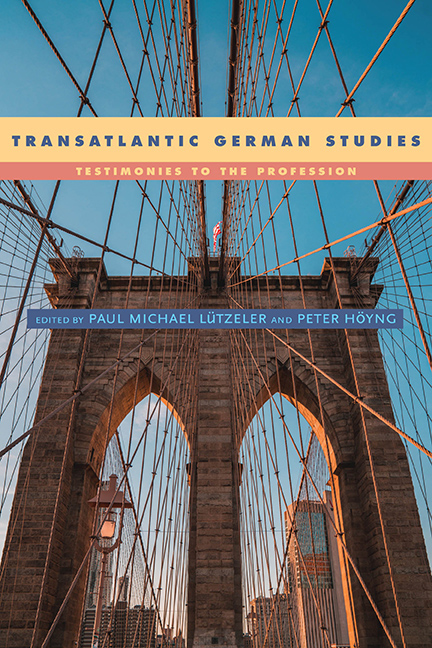Book contents
- Frontmatter
- Dedication
- Contents
- Acknowledgments
- Introduction
- From Erfahrungshunger to Realitätshunger: Futurity, Migration, and Difference
- In-between: The Participant as Observer—The Observer as Participant
- Transatlantic Space and My Own History of Globalization
- Deplazierte Personen: Why Would an American Become a Germanist?
- Metamorphoses and Meanderings of a Wanderer between Worlds
- German Studies as Vocation: My Path into It, Out of It, and Back into It
- My Long Way from Germanistik to Afro German Studies
- Mustang Red: My American Road to Critical Theory
- Third Place: How a French Germanist Became an Applied Linguist in America
- Transatlantic Exchanges: German Studies—European and American Style
- Being at Home in the Other: Thoughts and Tales from a Typically Atypical Germanist
- After Australia: Triangulating an Intellectual Journey
- A Tale in Translation: An Academic Itinerary from Istanbul to Bryn Mawr
- Beyond Passing: Transculturation in “Contact Zones”
- Far from Where? Germanistik between the Continents
- Epilogue: The Usefulness of Useless Studies
- Index
After Australia: Triangulating an Intellectual Journey
Published online by Cambridge University Press: 14 February 2019
- Frontmatter
- Dedication
- Contents
- Acknowledgments
- Introduction
- From Erfahrungshunger to Realitätshunger: Futurity, Migration, and Difference
- In-between: The Participant as Observer—The Observer as Participant
- Transatlantic Space and My Own History of Globalization
- Deplazierte Personen: Why Would an American Become a Germanist?
- Metamorphoses and Meanderings of a Wanderer between Worlds
- German Studies as Vocation: My Path into It, Out of It, and Back into It
- My Long Way from Germanistik to Afro German Studies
- Mustang Red: My American Road to Critical Theory
- Third Place: How a French Germanist Became an Applied Linguist in America
- Transatlantic Exchanges: German Studies—European and American Style
- Being at Home in the Other: Thoughts and Tales from a Typically Atypical Germanist
- After Australia: Triangulating an Intellectual Journey
- A Tale in Translation: An Academic Itinerary from Istanbul to Bryn Mawr
- Beyond Passing: Transculturation in “Contact Zones”
- Far from Where? Germanistik between the Continents
- Epilogue: The Usefulness of Useless Studies
- Index
Summary
IS THE “AFTER” IN “AFTER AUSTRALIA” the same as the “post-” in “postcolonial,” to borrow a little freely from Kwame Anthony Appiah's canonical essay? Or, likewise, to reappropriate Paul Michael Lützeler's term, what does it mean to have “einen postkolonialen Blick”? What does it mean to invoke “triangulation” in connection with the postcolonial gaze?
“Triangulation” derives from the surveying technique used in mapmaking: it involved the use of an instrument called a theodolite to measure distances by triangulating one's own position with two far-off points at some distance from each other. Commonly used in the colonial period, it enabled the surveyor to create maps of a given territory without actually traveling through difficult terrain. In this essay, I will use it metaphorically. Specifically, I will be arguing for the advantages of viewing the transatlantic binary from a third, outside perspective provided by my education in Australia and subsequent connections to that country.
Postcoloniality in 1950s Australia
Let me begin by clarifying some characteristics of Australian postcoloniality that take a special form. Probably the most striking aspect of Australian cultural life after World War II was what was termed the “cultural cringe.” A 1950 coinage by a Melbourne schoolmaster, A. A. Phillips, this term described a sense of inferiority to other countries—notably to Britain— that many Australians felt acutely at that time. Over the many decades since the first publication of Phillips's essay, the “cultural cringe” was variously interpreted and misinterpreted, accepted and denied. As a teenager during the mid- to late 1950s, I saw myself as a member of a generation that was beginning to move away from the cultural cringe, but in retrospect, I regard that self-assessment as a kind of wishful thinking. A striking and more widespread cultural shift came about much later, and had to do with new attitudes to what had formerly been called the “convict stain.” The Australian bicentenary in 1988 made it possible—and even fashionable—to acknowledge convicts in one's family, request abstracts of official records, and, once the internet became ubiquitous, to search online for “your convict” (the term used on many search websites). As it turned out, I had a convict on each side of my family: one of them had stolen a basket, and the other was a murderess.
- Type
- Chapter
- Information
- Transatlantic German StudiesTestimonies to the Profession, pp. 198 - 214Publisher: Boydell & BrewerPrint publication year: 2018



